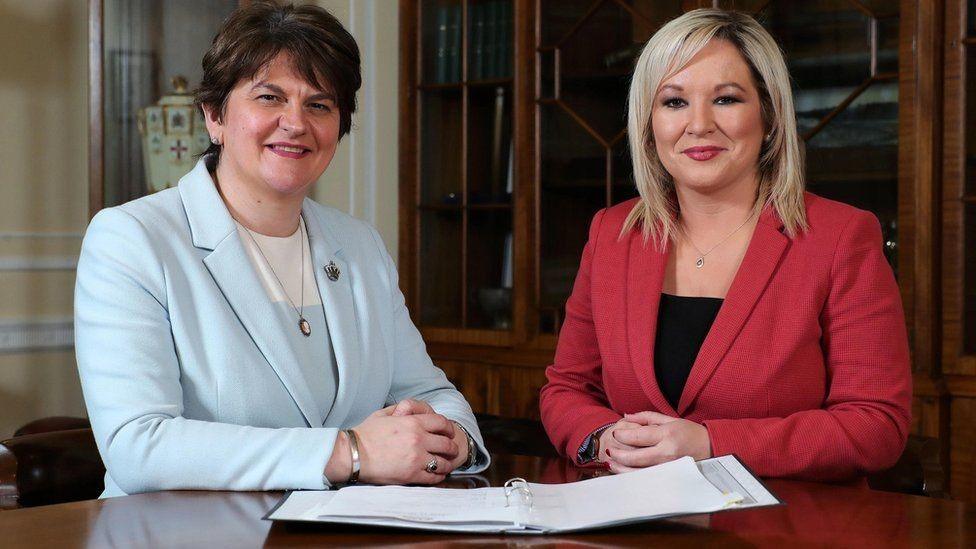NI 100: Newspapers clash on the King's 'Christmas gift'
- Published
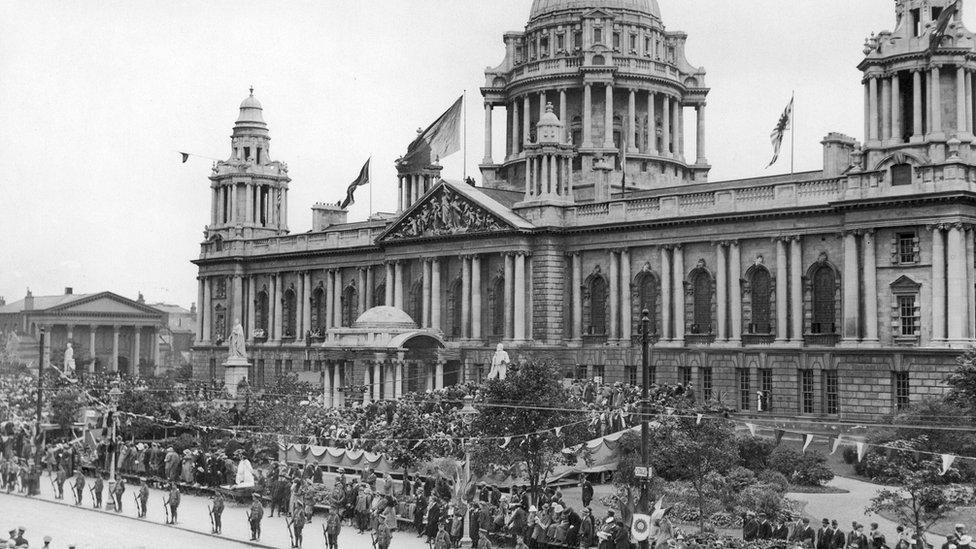
Crowds gathered outside Belfast City Hall in June 1921 for the opening of NI's first parliament
The front pages on Christmas Eve 1920 lacked the usual festive cheer, instead focused on a political story which would shape a century of Irish politics.
The previous day, parliament was told that the Government of Ireland Act had received royal assent, legislating for the partition of the island.
By design, Northern Ireland and Southern Ireland (later to become known as the Irish Free State) would have their own parliaments, with London maintaining control over issues such as foreign policy and the military.
Northern unionists, who had fought against an all-Ireland home rule for decades, reluctantly accepted the bill as a means to exercise self-government while retaining their position in the United Kingdom.
Northern nationalists, who wanted Irish independence, feared alienation as a minority but hoped "the end is not yet", as the Irish News reported.
BBC News NI looks at how the northern Irish newspapers reacted on 24 December 1920.

The Northern Whig
"Greatest constitutional experiment in British history"
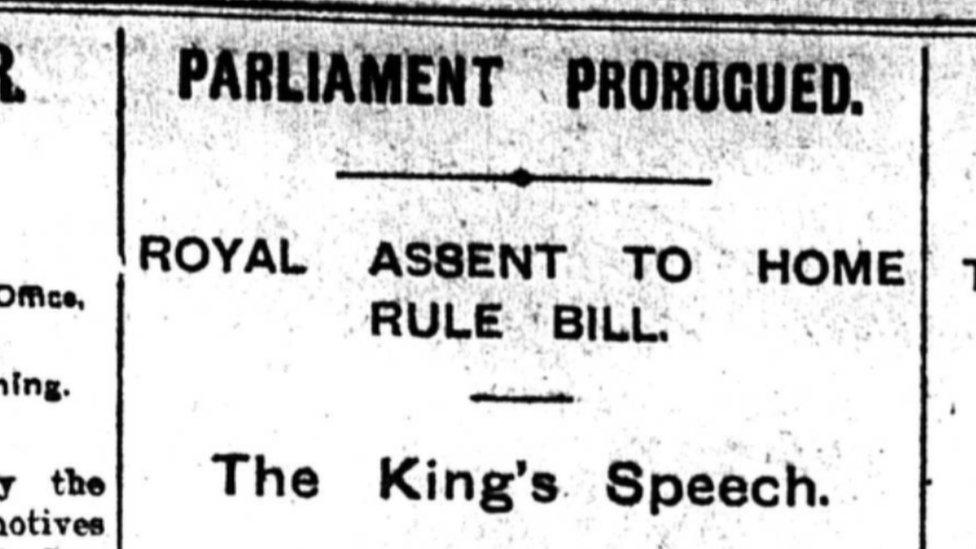
The Northern Whig, which ceased publication in the 1960s, was considered to be a liberal unionist newspaper.
On its front page, Prime Minister David Lloyd George was quoted as describing the Government of Ireland Act as motivated by "peace and goodwill", while a parliamentary colleague said it was "a Christmas gift to the emerald isle".
"The Ulster members are anxious to see it soon declared in operation in order that their area may lose no time in utilising the new right to self-government," the newspaper outlined.
"The southern peers profess doubt whether it will ever become operative in their part of the country, but hope that it may become a starting point for further negotiations."
The Northern Whig carried King George V's address to parliament in full, in which he said the state of affairs in Ireland grieved him "profoundly".
Lambasting "the campaign of violence and outrage by which a small section of my subjects seek to sever Ireland from the Empire", the monarch said he hoped there would be a return to "constitutional methods".
King George V continued: "I sincerely hope that this Act, the fruit of more than thirty years of ceaseless controversy, will finally bring about unity and friendship between all the peoples of my kingdom."
In its editorial, the newspaper described the Act as the "greatest constitutional experiment in British history".
The writer also criticised the policy of abstentionism by nationalist MPs, such as Joseph Devlin of the Irish Parliamentary Party, yet suggested the strategy also "proved a great relief to the cabinet and an aid to the speedy conduct of business".
"We do not think that either Sinn Feiner or Devlinite can look back upon these tactics without seeing that they have been hoist with their own petard," it continued.
Rather than "injuring the government or Ulster... they have landed themselves in a mess which is undoubtedly beginning already to trouble them".

The Belfast News-Letter
"There was no alternative"
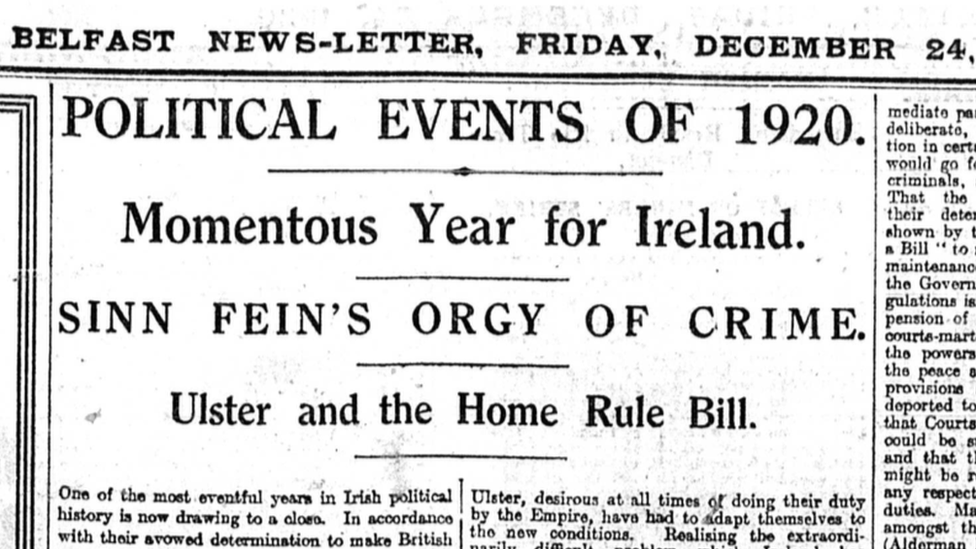
The Belfast News-Letter discussed how "one of the most eventful years in Irish political history is now drawing to a close".
Describing Sir Edward Carson as "the most popular and trusted leader in British politics today", its editorial said the decision by unionists to back the Act had been arrived at "with a certain amount of reserve and reluctance".
Sir Edward "uttered a grave note of warning", the paper continued, in which he told parliament "he regarded the Bill as fraught with disaster".
It suggested the inclusion of Donegal, Cavan and Monaghan within the Northern Parliament was "fought strenuously for".
However, "there was no alternative to the government's proposals" and they marked a "great improvement" on the previous Home Rule Act of 1914.
The bill fell short of Sinn Féin demands too, the article added, "whose leaders have said over and over again that they would not be satisfied with anything short of complete independence".
There is also a reference to Sinn Féin "scoundrels" perpetuating an "orgy of violence". The paper alleged the party "resorted to every kind of crime with the object of paralysing the arm of the law and intimidating and terrorising the community".
In a series of Christmas messages, prominent unionist figures used the newspaper to express support for the new Northern Ireland Parliament.
Sir James Craig, who would become Northern Ireland's first prime minister in 1921, said the bill was "on the one hand granting freedom to Ulster to manage her own affairs, and on the other maintaining the Imperial connection".
He writes: "God grant that our footsteps may never be diverted from the path of honour, and that future generations of Ulster men and women may have occasion at all times to bless those who are about to lay the foundations of a structure round which will centre all their hopes, and from which should flow manifold blessings and benefits to a people whose forefathers fought and died for civil and religious liberty."
John Miller Andrews, who would succeed Sir James Craig as prime minister in 1940, described the Act as "an earnest attempt to solve the Irish problem".
"Whilst it concedes to Irish Home Rulers large powers of self-government," he explained, "the Act has been accepted by Ulster Unionists because it gives us a Northern Parliament of our own."

The Irish News and Belfast Morning News
"The end is not yet"
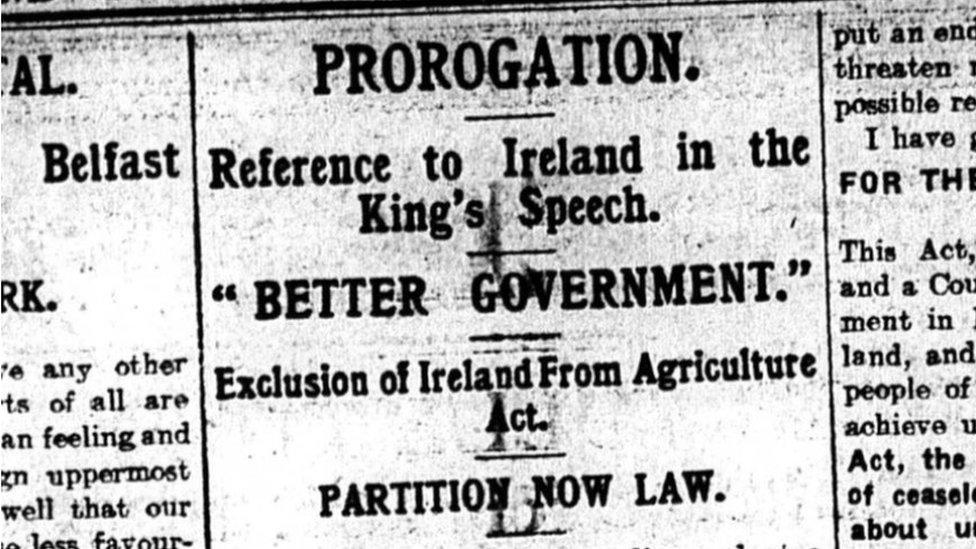
"Partition now law" read the headline of The Irish News and Belfast Morning News.
In a scathing editorial, the nationalist-leaning newspaper questioned the Act's description as being "for the betterment of Ireland".
"There is not a man or woman in this country who does not realise, and know, that such a description of the abominable Act signed by some Lords in the name of the King last night is a bitter mockery, and a barbed insult to this nation."
The Partition Act, as the paper labels it, is a "plan devised by unscrupulous politicians to assassinate Ireland's nationality".
It is a "fragrant example of treachery", the writer elaborates, and is "repulsive and abhorrent to 90 percent of the Irish people".
The Act has also not "aroused a scintilla of enthusiasm amongst the remaining 10 percent" and is "spurned with contempt" by 25m Irish people abroad.
"A more ghastly 'Christmas gift' was never thrust on our nation; and this country has seen many sad and bitter Christmas Eves in the course of its history," the newspaper continues.
"But the end is not yet."
The writer explains that the "glorious vision" of a "union of the peoples of Ireland" will one day be achieved.
They said this could be "perhaps all the sooner and more effectively for the existence of the infamy to which the Royal Assent was given on the day before Christmas Eve 1920".

Belfast Telegraph
"Hopes for unity from Home Rule Act"
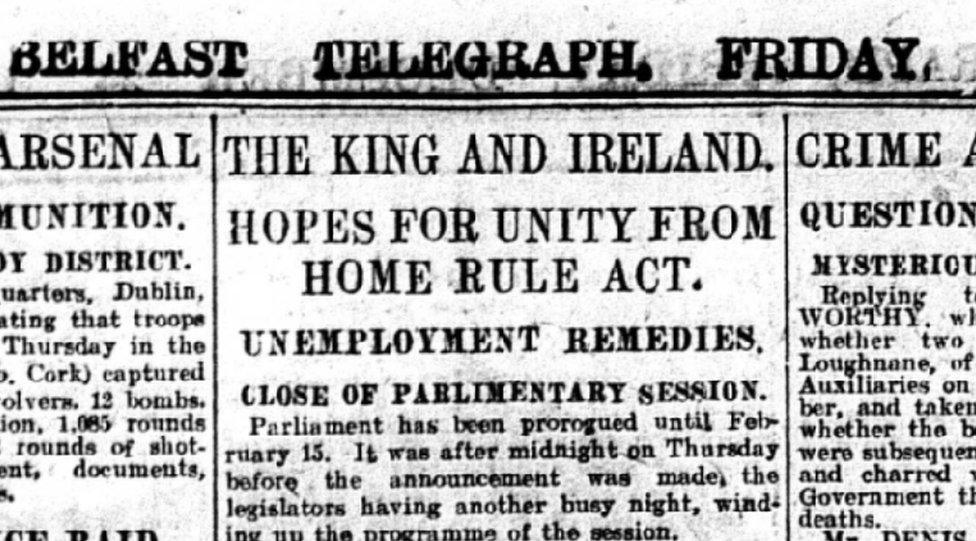
The Belfast Telegraph reported that unionist leader Sir Edward Carson and his colleagues will "desire that 'the appointed day' under the Act should be declared as early as possible".
This is "in order that they may proceed to set up the Northern Parliament".
"There is quite a possibility that their wish may be met before the New Year is far advanced," the paper continued.
Referring to the King's address to parliament, it explained: "His sympathy went out to the loyal servants of the Crown who were endeavouring to restore peace and maintain order under conditions of unexampled difficulty and danger."
A return to constitutional methods thereby "alone could put an end to the terrible events which now threatened to ruin the country and make possible reconciliation and a lasting peace".
"The Better Government of Ireland Act provided the means whereby the people of Ireland could of their own accord achieve unity."
The Belfast Telegraph also highlighted other matters contained within the King's speech to parliament on 23 December 1920.
The close of the parliamentary session brought with it a warning of an "unavoidable" high public expenditure due to "the obligations arising out of the Great War, and the disturbed conditions still prevailing in a large part of the world".
"His Majesty was conscious of the great sacrifices entailed and of the vital need of economy in all departments in the public service, and his Ministers continued to make every effort to reduce expenditure," the paper reported.

Related topics
- Published23 December 2020
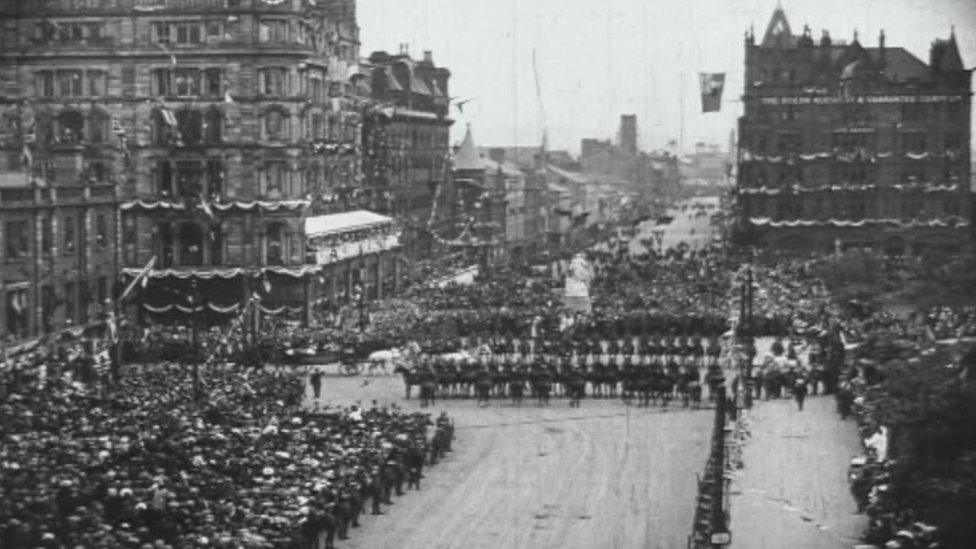
- Published21 December 2020
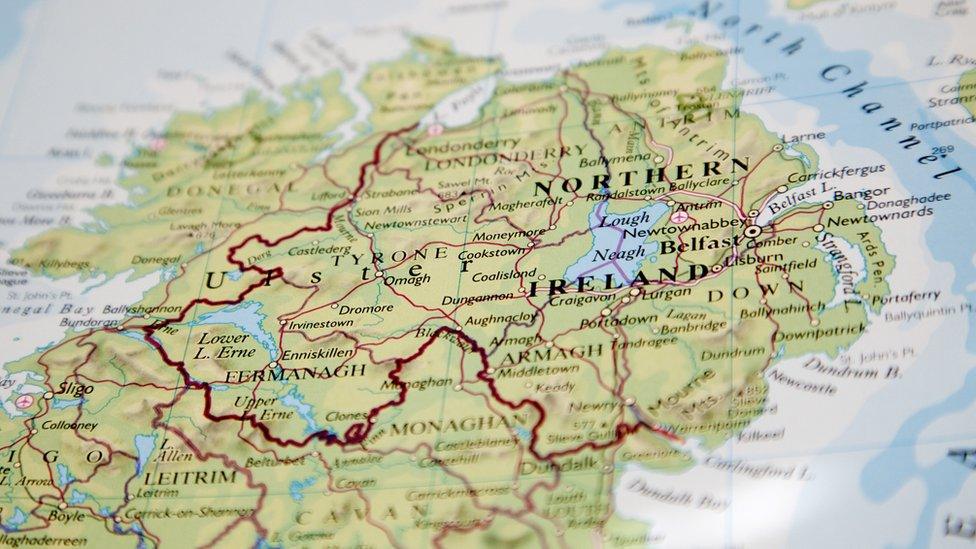
- Published23 December 2020
